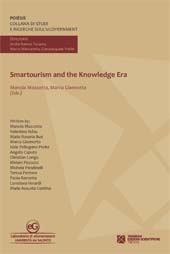Smartourism and the knowledge era
157 p.
Includes bibliographical references.
Smartourism and the Knowledge Era […] In the current discourse on the future EU regional policy, smart specialization exhibits a strong focus and plays a strategic role, but what is smart specialization? The intellectual origins of the concept “smart specialization” were first outlined by Dominique Foray and Bart Van Ark in their studies on the productivity gap between the U. S. and Europe.
The entrepreneurial discovery is a learning process that implies a complex combination of public policies, private commitments and context conditions regarding economic, social and environmental dimensions; the process of smart specialization is not simply the advent of an innovation but the deployment and variation of innovative ideas in a specialized area that generate knowledge about the future economic value of a possible direction of change […] The development of a smart specialization strategy, at a national and a regional level, implies a policy process that follows a complex and iterative logic that cannot be described neither as essentially “top down” nor essentially “bottom up” […] On the other hand, smart specialization implies a strategic vision and a choice which is not neutral with respect to the various economic sectors.
As stated by Foray and Goenega (2013) the smart specialization is not a planning doctrine that would require a region to specialize in a particular set of industries. Thus, rather than offering a method for determining if a hypothetical region has a “strength” in a particular set of activities, e. g., tourism and fisheries, the crucial question is whether that region would benefit from and should specialize in certain R&D and innovation projects, in some lead activities such as tourism or fishery.
Tourism has been one of those sectors which could benefit from recent innovations resulting from Information and Communication Technology, with major transformations, both in terms of supply and demand. […] Tourism itself is inherently a complex and multidimensional field. It embraces social, cultural, and environmental characteristics, includes the buying, selling, and management of services and products, policy initiatives, economic development, environmental goals, and sustainable planning […]. Therefore, smart tourism is a process; that is to say a process of identification and selection of desirable areas for intervention, implying choices of technologies, fields, sub-systems that could be favoured within the framework of the regional policy […]. by the introduction of Manola Mazzotta (2014) [Publisher's text]
Collected essays.
-
Chapters from the same volume (available individually)
-
Information



